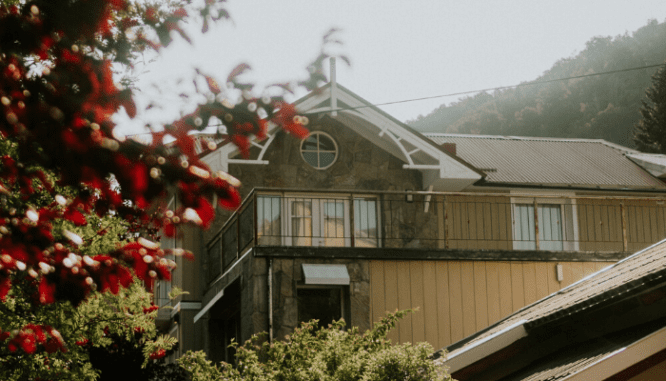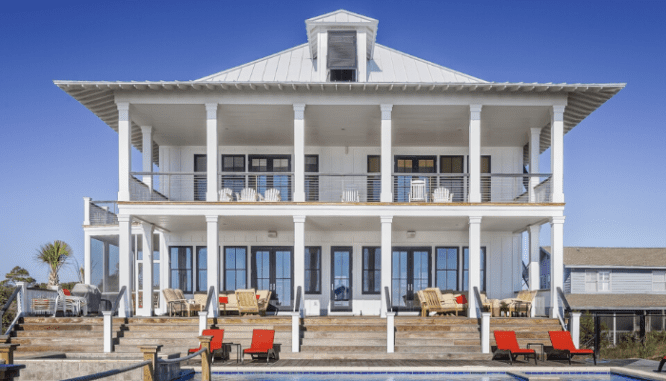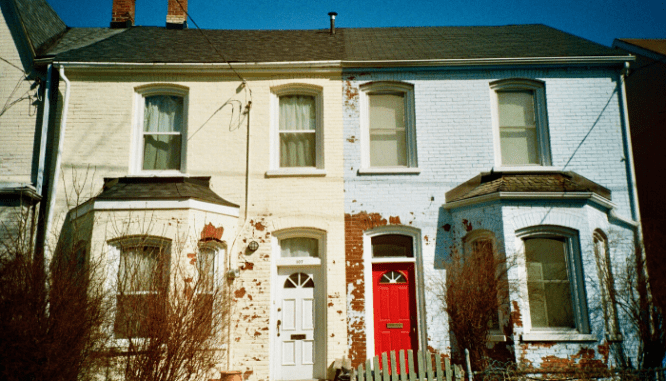Is It a Good Idea to Buy a House in Foreclosure? The Pros and Cons
- Published on
- 7 min read
-
 Rachel Russell Contributing AuthorClose
Rachel Russell Contributing AuthorClose Rachel Russell Contributing Author
Rachel Russell Contributing AuthorRachel Russell is an author represented by a literary agent, as well as a content marketer and editor. She is knowledgeable about all things home shopping, landscaping, decor, and budgeting as a first-time homebuyer.
You’ve long admired a certain house in a cozy neighborhood. You find yourself driving past it some days when you don’t have to. There’s just something about it that calls to you. When you see that it’s foreclosed, you know deep down that now is the time to buy it.
But, is it a good idea to buy a house in foreclosure? The answer to that question will depend on a variety of factors. As with most things in life, there are pros and cons to buying a home in foreclosure.
We’ve spoken with top experts and researched the different advantages and drawbacks to buying a house in foreclosure so you don’t have to. Keep reading to find the answers to your foreclosure questions.

What’s a foreclosure?
A foreclosure is a home that has been put up for auction by a bank. Foreclosures happen when the owners stop making mortgage payments. As a result, the bank repossesses the house and puts it up for sale at a foreclosure auction. In 2019, foreclosure sales accounted for 11.5% of all real estate transactions.
Foreclosure auction
Foreclosure auctions are competitive, according to Dawn Dause, a top-selling real estate agent in Will County, Illinois, who has more than 18 years of experience. “Investors are out there in full force. You have to be a cash buyer to compete.” Lenders will not finance a foreclosure purchase, so you won’t be able to get a mortgage.
Part of the reason foreclosed homes sell so fast is because there are fewer on the market, and their prices also usually aren’t as low as they were after the Great Recession. Forty percent of top agents agree that the No. 1 factor impacting real estate markets is an inventory shortage.
REO property
If the foreclosed house fails to sell at auction, it then becomes an REO property. REO means “real estate owned” and is another way of saying it’s owned by the bank. There are REO agents you can find who specialize in foreclosure listings.
Short sale
Another option for you to check out is a short sale. A short sale is a home that’s about to go into foreclosure but is still owned by the homeowner.
When you buy a home in a short sale, you might be able to buy the house for the amount of the remaining mortgage balance, or just above it. This means sometimes you can buy a house for far below its estimated value!

The pros
There are a number of advantages when it comes to buying a house in foreclosure.
“If you can get it for the right price and stay on budget, it’s instant equity,” says Dause. “You just need to run your numbers and be smart. Keep in mind that, on average, you can spend over 20% of what you planned when it comes to repairs and upgrades.”
You may save big
Some foreclosed homes sell for less than what they’re worth. It’s possible you could save up to 15%!
This might even present you with the opportunity of moving into a specific neighborhood you might have otherwise been unable to afford. However, such a big savings isn’t a guarantee with every foreclosed property.
More room for negotiations
When it comes to REO properties and short sales, you’ll have more leeway to negotiate.
In these instances, you can have a home inspection or appraisal done. This will ensure you know what you’re getting before you buy it.
Getting a mortgage for an REO property is also possible. In fact, many banks will invest in renovating the home before putting it on the market.
Less competition from traditional buyers
When you’re looking to buy a foreclosed property, there won’t be as many traditional buyers to compete with. Forty-eight percent of first-time homebuyers want a turnkey home, meaning they aren’t looking for the work associated with most foreclosed properties.
Huge potential for a return on investment
If you’re able to buy a house for far below its estimated value, you’ll pull in a massive return on your investment. Buying a house at a foreclosure auction can be a gamble because you won’t know what you’re getting. If you want a safer bet for your investment, look for REO or short sale properties, which you can usually tour or inspect before you make an offer.

The cons
When it comes to drawbacks to buying a foreclosed house, there are a few. One of the biggest ones is that when dealing with a foreclosure auction, you aren’t allowed to tour the inside of the house, so there are a lot of unknowns.
You’re buying the house as-is
As Dause warns, you aren’t allowed to inspect a foreclosed property beforehand, and when you buy it, it’s as-is.
“You don’t know for sure what’s behind the walls. Sometimes the previous owners damage the home on purpose.”
Damage could be extreme
While a foreclosed property might be your gain, for the previous owner, it’s often a traumatic loss. Prior homeowners often fall behind on mortgage payments because of unemployment or health problems. With emotions running high, it’s not unheard of for foreclosed homeowners to destroy a home before their eviction.
“I’ve seen cement poured down water lines,” Dause says. “I’ve even once arrived to inspect a foreclosed house and found water flooding out the front door. The previous owner had broken the water pipe in the basement and left it to flood.”
Repair costs might stack fast
With so many unknown factors, you might end up having to spend quite a bit of money to make the house livable.
Jeff Barnes, owner of Benchmark Property Inspections, says the likelihood for costly repairs that aren’t disclosed is high. He’s a certified ASHI inspector who’s been in business for over 31 years.
“Foreclosed homes can sometimes be in bad shape,” he says. “While it depends on the age of the house, some of the most common issues tend to be plumbing and structural problems.”
Watch out for liens
When you’re buying a home “as is,” that means you get not only the house in the shape it’s currently in, but also the title — including any liens placed on the property.
Some of the most common liens you might run into are contractor liens or divorce decrees. Contractor liens happen when general contractors or subcontractors who did home renovations or repair work are still owed money. A lien placed because of a divorce decree is often the result of past-due child support or spousal support.

The house might be occupied
If a home has been vacant for several months to years, there might be unwelcome inhabitants.
It doesn’t take long for critters, like insects and worse, to figure out a home is empty. Mice will find the tiniest cracks and squeeze through to take shelter from the cold inside foreclosed homes.
There’s also the possibility of human inhabitants, according to Barnes. He’s come across runaways, squatters, and drug addicts. “It can sometimes be dangerous, so don’t go in alone when inspecting the property for the first time.”
Foreclosures can’t be inspected
If you buy a house at a foreclosure auction, you have to take it as-is. That means you aren’t able to tour the property beforehand to know whether it has some serious problems going on inside or not.
That’s why many buyers prefer to instead go with REO homes. You can make an offer on an REO property with the contingency that it passes an inspection. A home inspector will be able to find hidden problems.
When you’re looking for a home inspector, Barnes notes you should make certain they have an ASHI designation. This will tell you that the inspector is certified and reliable.
Possession can be delayed
Occasionally, the bank delays when it comes to processing a sale. Banks have been known to take forever to consider an offer, or can simply be slow to process paperwork during the escrow process.
You’ll also sometimes be forced to contend with the former owner if they haven’t been fully evicted. Even if you own the home, you’ll still have to wait for the current occupants to move out.
Also, know that if you’ve made an offer but not yet secured the deal, you still stand the chance of losing the house at the last second. If the original owner is able to pay off their loan, you can say goodbye to the house. Some states give the former homeowner the right to redeem their home after a foreclosure sale.
Competition from investors
While you won’t have to deal with traditional homebuyers, you will be up against investors.
A foreclosed property is an attractive deal to an investor who’s looking to flip the property or turn it into a rental. Most investors make all-cash offers with few to no contingencies, so their bids are often more attractive to banks.
If you don’t bring an all-cash offer to the table, you’ll have little chance of securing a mortgage. Also, be aware that you can’t get a foreclosed home financed. With a short sale or REO home, you can.

So, is it a good idea to buy a house in foreclosure?
Each foreclosed house is going to be unique, and every buyer will have their own personal expectations.
Buying a foreclosed home can be a good idea if you have the financial cushion to absorb any potential problems. If you aren’t worried about there being potential issues or the cost to repair them, then buying a foreclosed property is likely a worthwhile investment for you. Depending on the age of the property, you should set aside anywhere between 1% to 4% of the purchase price.
Similarly, if you aren’t in a rush to move into the property, it can be a great idea. Having to repair a house to make it livable can take time. If you don’t have any time constraints holding you back, then move ahead with looking for a foreclosed property.
However, if you have tight financial limits and are hoping to move into a home soon, a foreclosure property could turn into your biggest nightmare.
You don’t want to use up your entire savings to simply buy the house, then be stuck with broken water lines or no power supply. Be sure to give proper caution to knowing how much money you’re working with to handle unforeseen problems, and be aware that certain repairs can take weeks to months to be completed.
Buying a home is a huge deal, and you don’t want to rush into it simply because you can get a good deal on the price. Make sure to work with a top real estate agent who can walk you through the process and help you avoid any complications.
Header Image Source: (Steve Heap / Shutterstock)
